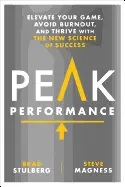
Peak Performance - by Brad Stulberg and Steve Magness
ISBN: 162336793XDate read: 2017-09-02
How strongly I recommend it: 2/10
(See my list of 430+ books, for more.)
Go to the Amazon page for details and reviews.
A fine summary of the other books on the subject of performance, deliberate practice, mastery, willpower, etc. But I’ve read all the books that this one references, so this had nothing new for me. If you haven’t read those others, this would be a good starting book for you.
my notes
Set a goal on the outer boundaries of what you think is possible, then systematically pursue it.
Periodization: Balance the right amount of stress with the right amount of rest. Stress + rest = growth.
Challenge is followed by a slight dip in function. But after you rest and recover, you adapt and become stronger, to push a little harder in the future.
Figure out the right balance, so you don’t either get hurt or burn out (too much stress, not enough rest) or become complacent and plateau (not enough stress, too much rest).
Stress demands rest, and rest supports stress.
Almost all great intellectual and creative performers do:
1.Immersion: deep focus on work
2.Incubation: rest, not thinking about work
3.Insight: “aha”: new ideas and growth
The more you resist temptation, think deeply, or focus intensely, the better you get at it.
Growth comes at the point of resistance. You learn by pushing yourself to the outer reaches of your abilities.
Students who were forced to struggle on complex problems before receiving help from teachers outperformed students who received immediate assistance.
Don’t multitask. Ever.
Compartmentalize your day down to the hour. Each compartment has a concrete objective.
Be fully intentional with how you spend your time.
Elite runners feel pain and discomfort during their hard workouts, but they react differently. Rather than panicking, they have a calm conversation: “This is starting to hurt now. It should. I’m running hard. But I am separate from this pain. It is going to be okay.” Like meditation, choose how to respond to the stress of a workout.
Walking tends to be more effective at fostering creativity than other movements that require greater focus.
Being in nature, or even just looking at pictures of nature, helps with the transition from stress to rest and promotes creative thinking.
Use a writing-only computer. When an object is isolated for a specific task, the link between subject (writer) and object (computer) strengthens. Over time, the mere sight of that specific computer invites writing.
Link key activities to the same context (e.g., time of day, physical environment).
Decision fatigue:
Judges granted prisoners parole 65 percent of the time at the beginning of the day, but nearly zero percent of the time at the end of the day.
Physicians make significantly more prescribing errors as the day wears on.
Physical fatigue occurs not in the body, but in the brain.
The brain comes in and creates a perception of failure before we actually harm ourselves.
We constantly weigh how hard something feels against our motivation to do it.
When perception of effort is unbalanced with the motivation, we slow down or ease up until the two are balanced.
The more motivated we are, the greater the effort we are willing to tolerate.
You can improve your performance by either decreasing your perception of effort (training so that it feels easier) or by increasing your motivation.